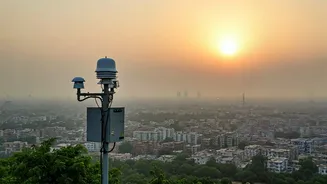Air Quality Assessment
Noida's air quality has seen a marginal enhancement, according to recent findings. This improvement, however, has been met with a cautious outlook from
specialists. They assert this change is only a fleeting one, suggesting that the underlying causes of poor air quality persist. These experts stress that this temporary respite shouldn't be mistaken for a lasting improvement. The need for continuous monitoring and more efficient pollution control strategies is emphasized to ensure the air quality stays improved over time. Therefore, while a brief improvement has occurred, sustained efforts remain critical for genuine and lasting change.
Pollution Hotspots Identified
Authorities have pinpointed 17 pollution hotspots located within Noida and Ghaziabad. These areas, based on extensive surveys, are contributing significantly to the region's overall air pollution levels. The designation of these hotspots is an initial stride in a broader effort to concentrate pollution control measures in the most affected zones. Focusing on these specific areas enables authorities to carry out targeted interventions, such as stricter monitoring, enhanced enforcement, and localized pollution reduction strategies. Identifying hotspots facilitates more effective resource allocation and enables the implementation of customized solutions to combat pollution, leading to improved air quality in the long run.
Temporary Improvement Explained
Experts attribute the current, albeit small, improvement in air quality to several likely causes, including changes in weather conditions and possible short-term decreases in industrial activity. Seasonal weather patterns, such as wind direction and precipitation, can play a significant role in influencing air quality by dispersing pollutants. Furthermore, short-term economic variations or particular actions in key polluting industries can also lead to temporary improvements. It is important to note that these improvements are often transient and not indicative of any permanent shift in the underlying conditions. The experts advise against complacency, underlining the need for persistent, long-term interventions to mitigate pollution at the source and establish sustainable air quality.
Future Air Quality Outlook
Looking ahead, the outlook for air quality in Noida and Ghaziabad depends on continued pollution control efforts and strategic policy execution. Long-term solutions involve sustained interventions, such as the adoption of cleaner technologies, improved waste management, and the enforcement of stricter emission standards across all major pollution sources. The collaboration among governmental bodies, industries, and residents is crucial to achieving noteworthy and long-lasting air quality enhancements. Regular monitoring of air quality, along with timely updates, will be critical in adapting pollution control measures to suit changing scenarios. These multifaceted approaches and collaborative endeavours are essential for the betterment of the region's air quality and inhabitants' health.




















